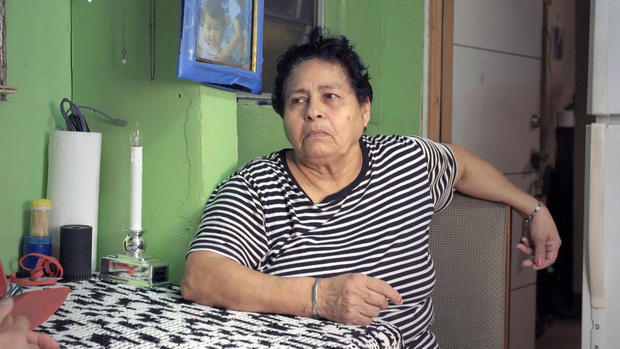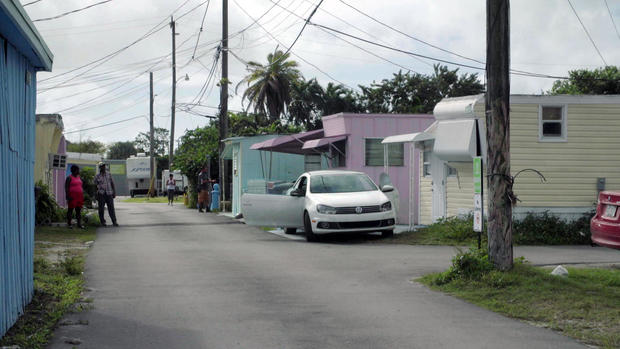REVERB is a new documentary series from CBSN Originals. Watch the latest episode, “Rising Tide: Priced Out in Miami,” in the video player above. It premieres on CBSN Sunday, March 22, at 8 p.m.
Alba Hernandez lives in one of Miami’s few affordable pockets. She’s owned her mobile home in the city’s Little River neighborhood since 2003. When she moved in, rent for the patch of land under her house was $245 a month — below what she’d pay for an equivalent apartment in the city.
Hernandez was used to the less-than-$20-a-month increases she would get every year. But two years ago, she got a rude surprise. The trailer park had a new owner who wanted to hike Hernandez’s rent to $700 — a nearly 50% increase.
“I can’t find the money at this moment. That is impossible for me in this moment,” said Hernandez, who lives on a fixed income and says medical issues prevent her from working.
Hernandez and many of her neighbors in the community of 800 are fighting the hike in court. The new owner, Miami SOAR Management Corp., responded by sending more than 100 eviction notices. The case is ongoing, and Hernandez said the stress from the twice-a-week letters from the landowners exacerbates her health issues.
“They don’t like us. They don’t worry about us. They want more money,” she told CBS News.
The scenario is a common one in many low-income communities in increasingly pricey cities. But in low-lying Miami, it’s more than real estate speculation driving the new owners. It’s also the fear of climate change.
The city, whose most exclusive neighborhoods are close to the sea and barely above sea level, is increasingly getting flooded during high tides. The city is moving to raise streets and sidewalks by two feet, at a cost of about $1 million a block, but adaptation will only be a partial help. Water is rising right through the ground, permeating the porous limestone on which much of Miami sits. The sea walls other cities are considering won’t work here.
Increasingly, the wealthy residents living near Miami’s shores are looking at another option: Move inland to higher ground, to historically less desirable neighborhoods populated by working-class people.
Even mobile home parks, because of where they are, are vulnerable to such gentrification.
“You don’t really find mobile home parks in Miami Beach. You find them more inland. And now as developers are looking inland for long-term development, these mobile home parks are vulnerable,” said Nejla Calvo, an attorney representing Hernandez and the 800 other residents of the SOAR mobile home park.
In the last five years, greater Miami has lost seven mobile-home parks, or about 700 housing units, Calvo estimated. One of these parks is now home to Magic City, a multimillion-dollar development that will eventually include 2,600 housing units. Rents for those are not yet set.
Mobile home parks are one of the few affordable options in a country that’s seen skyrocketing housing costs. In Florida, 1 in 6 housing units is a mobile home, Calvo told CBS News.
Despite their name, most mobile homes are affixed to the ground and not readily moveable. So if a homeowner loses the land they’ve been renting, their options are to abandon the site and move in with relatives in Miami or leave the city altogether, Calvo said.
“I, unfortunately, expect to see more in the years to come because there’s a limited amount of space in Miami that’s developable,” Calvo said. “These mobile home parks are located in areas that are more and more desirable, especially with climate change and with flooding and areas in Highlands are more attractive to developers.”
The park’s owners don’t disagree.
“Just the dirt of the land itself is worth far more than the original owner could ever have imagined 50 years ago,” said Martin Feldman, an attorney for Miami SOAR Management Corp. “You’re talking about a million dollars of square foot property here.”
The company plans to develop the plot in the next three to four years, building luxury housing along with up to 2,500 units of affordable housing, Feldman said. He added that none of the mobile home residents would be forced to move if they didn’t want to. He also denied that mobile home residents have been evicted, describing the eviction notices as a negotiating tactic.
But some residents of the park, unwilling to fight the rent hikes, have already left, Calvo said. While about half of the 100 eviction attempts were dismissed, about 20 are still pending, she said.
For Hernandez, whose only child lives in Honduras, leaving isn’t option, and neither is moving into her sister’s already full house. They’ve looked for someplace else to live, but so far, they’ve had no luck.
“It’s the same problem,” she said. “The money. The money is a problem in this country.”


